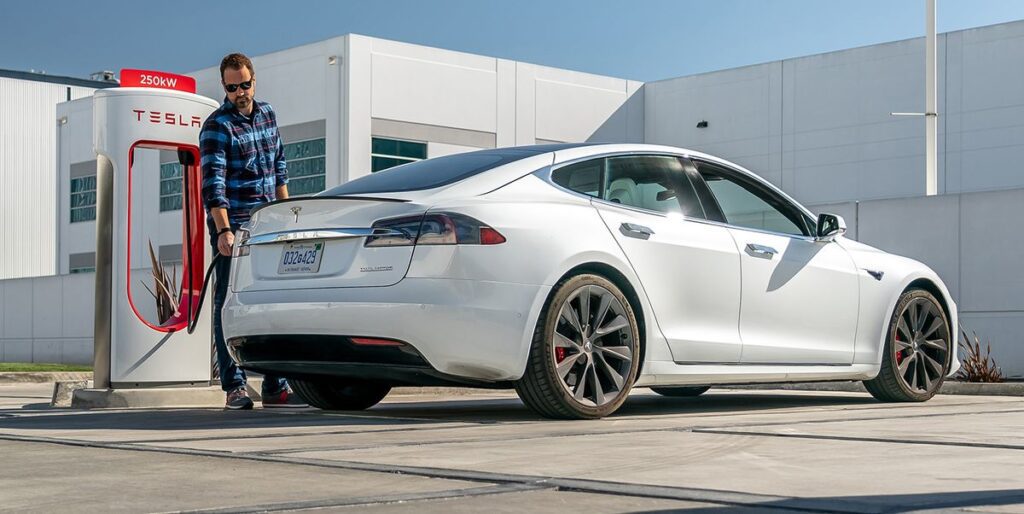Tesla Will Begin Opening U.S. Supercharger Network to Outside Brands

Tesla will open a portion of its U.S. charging infrastructure to outside manufacturers for the first time. At least 7500 Tesla chargers will become available for non-Tesla EVs by the end of 2024, with roughly 3500 new and existing 250-kW Superchargers along highway corridors, and 4000 Level 2 chargers at destinations like hotels and restaurants. After years of maintaining a contained system, the switch will give Tesla access to a slice of $7.5 billion being released in federal charging infrastructure investment.
One of the prevailing factors in Tesla’s dominance in the EV segment has been the superiority, reliability, and sprawling coverage of its charging network. A portion of that network will become available for non-Tesla owners for the first time, according to a statement from the White House on Wednesday.
Compared to the rest of the industry, Tesla’s charging network is huge. According to data from the Department of Energy, Tesla Supercharger sites make up roughly 24 percent of all DC fast-charging sites in the U.S. Adittionally, with more than 17,000 fast-charge cables, Tesla has more than 61 percent of all available fast-chargers in the U.S.
The company will now make at least 7500 chargers available for EVs outside of its native ecosystem. By the end of 2024 roughly 3500 new and existing 250 kW Superchargers along public highway corridors will be opened to non-Tesla EVs. On top of that, roughly 4000 public facing Level 2 chargers from Tesla will be placed at what the White House is naming “Destination Charging” locations at places like hotels and restaurants.
Uncle Sam Steps In
The move to allow out-of-network vehicles to utilize its network doesn’t come from a miraculous change of Elon Musk’s heart. The company needs to adopt CCS availability to earn a slice of $7.5 billion in federal charging infrastructure spending, which it would otherwise see none of.
Similar to the stipulations surrounding public funding of EV development, the White House is requiring that effective immediately, final assembly and all charging station–related manufacturing for such components as iron or steel charger enclosures or housing occur in the United States. Additionally, by July 2024, at least 55 percent of the cost of all components will need to be spent on products manufactured domestically.
Car and Driver
One White House official said at a briefing that as long as its chargers allow other vehicles to charge using CCS, Tesla will be eligible for a subsidy, including retrofitting the existing charging infrastructure, as reported by Reuters.
Tesla has opened its Supercharging network to outside EVs before, just not here in the U.S. It launched a pilot program in the Netherlands in 2019, starting with 10 Supercharger locations. After years of the European Union talking about requiring all EV chargers to be compatible with all modern EVs, the company shifted from the proprietary charging port it uses in the States, and began selling vehicles with a CCS connector in Europe.
More Ports More Problems?
Tesla’s network can be compared to the Apple ecosystem. The company controls nearly all the variables, and in turn, the system works in a plain and simple way. In addition to simply being less extensive, charging networks such as ChargePoint, Electrify America, and EVGo are subject to frequent issues with bandwidth and broken or inoperable chargers, according to user complaints. A 2022 survey by Plug In America reported that the most commonly reported issue by EV owners was broken or non-working chargers, though the Tesla Supercharger network scored “significantly better than its competitors on every metric.”
Opening the system to add CCS compatability in conjuction with the proprietary hardware and software could result in Tesla’s charging network losing its reputation for reliable fast-charging. Guidehouse Insights analyst Sam Abuelsamid thinks so: “There is a strong likelihood that if they open the supercharger network to other vehicles, their current excellent reliability rate will decline significantly,” Abuelsamid said, as quoted by Reuters.
This content is imported from poll. You may be able to find the same content in another format, or you may be able to find more information, at their web site.



